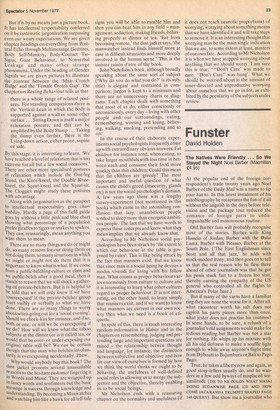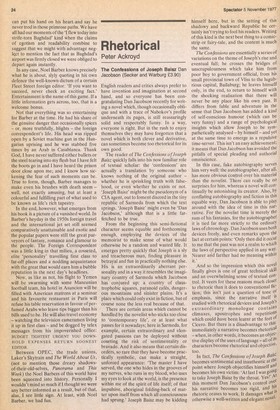Funster
David Holden
The Natives Were Friendly So We Stayed the Night Noel Barber (Macmillan £4.95) At the popular end of the foreign correspondent's trade twenty years ago Noel Barber of the Daily Mail was a name to tip your hat to. In this latest instalment of his autobiography he recaptures the fun of it all without the anguish in the days before television and the package tour reduced the romance of foreign parts to undistinguishable and monotonous routine.
Old Barber fans will probably recognise most of the stories. Barber with King Hussein of Jordan, Barber with the Dalai Lama, Barber with Picasso, Barber at the South Pole. ('The First Englishman since Scott and all that jazz,' he adds with mock-modest irony; and then goes on to tell us that the real reason why he flew there ahead of other journalists was that he got his penis stuck fast to a frozen loo seat, thereby earning the sympathy of the US general who controlled all the flights to America's Polar base.) But if many of the yarns have a familiar ring they are none the worse for it. After all, what raconteur worth his salt does not exploit his party pieces more than once, what jester does not practise his routines? In some hands, to be sure, a rehash of a journalist's old assignments would make for tedious reading but Barber was not a star for nothing. He whips up his mixture with all his old deftness to make a soufflé light enough to while away anyone's flight time from Djibouti to Bujumbura or Bali to Pago. Pago, True, he takes a liberty now and again, as good story-tellers usually do, and he wanders in a few odd byways of misplaced versimilitude (DH TO NB COLON WHAT MASAI DOING SUDANWISE PAGE 120 AND HOW COME JACARANDA TRUMPET SHAPED PAGE 148 QUERY). But show me a journalist who can put his hand on his heart and say he never trod in those primrose paths. We have all had our moments of the 'I flew today into strife-torn Baghdad' kind when the claims of egotism and readability combine to suggest that we might with advantage neglect to mention the fact that as Baghdad's airport was firmly closed we were obliged to depart again instantly.
In any case, Noel Barber knows precisely what he is about, slyly quoting in his own defence the well-known dictum of a certain Fleet Street foreign editor: 'If you want to succeed, never check an exciting fact.'
Entertainment is the name of this game. If a little information gets across, too, that is a welcome bonus.
Not that everything was so entertaining for Barber at the time. He had his share of the genuine danger that occasionally spices — or, more truthfully, blights — the foreign correspondent's life. His head was ripped open by a Soviet machine gun in the Hungarian uprising and he was stabbed five times by an Arab in Casablanca. Thank God, I have never suffered either bullets or the steel tearing into my flesh but I have felt the boots go in and I have heard the prison door close upon me; and I know how sickening the fear of such moments can be. True to form, though, Barber manages to make even his brushes with death seem — well, not exactly amusing, but at least a colourful and fulfilling part of what used to be known as life's rich tapestry.
In the end, however, what emerges from his book is a picture of a vanished world. In Barber's heyday in the 1950s foreign travel and the international jet set still seemed comparatively unattainable and exotic and the popular papers were still the great purveyors of fantasy, romance and glamour to the people. The Foreign Correspondent was a little king in that milieu, a cosseted, elite 'personality' travelling first class to far-off places and a nodding acquaintance with the great that would earn him a bubble reputation in the next day's headlines.
Now, as like as not, his flight to Yemen will be swarming with some Mancunian football team, his hotel in Asuncion will be filled with American matrons at a seminar and his favourite restaurant in Paris will refuse his table reservation in favour of perfumed Arabs who leave tips bigger than his bills used to be. He will also travel economy — watching the television cameramen living it up in first class — and be dogged by telex messages from his impoverished office:
BUDGET TIGHTEST URGENT YOU DOWNHOLD EXPENSES RETURN SOONEST EDITOR.
Between OPEC, the trade unions, Laker's Skytrain and The World About Us, (not to mention those dreary shadowsof-their-old-selves, Panorama and This Week) the Noel Barbers of this world have been squeezed into history. Personally I wouldn't mind so much if I thought we were any better informed as a result, but of that, alas, I see little sign. At least, with Noel Barber, we had fun.



































 Previous page
Previous page